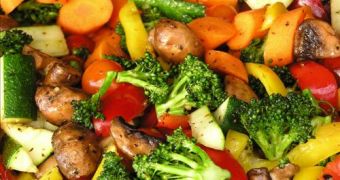Have you eaten your vegetables? If not, this may be bad news for your breasts. A new research published in the "American Journal of Clinical Nutrition," and carried out by a team at the Vanderbilt-Ingram Cancer Center and the Shanghai Cancer Institute in China, has found a connection between the consume of certain vegetables and a lowered risk for breast cancer.
"3,035 women diagnosed with breast cancer were identified through the Shanghai Cancer Registry. They were closely matched with 3,037 women randomly chosen from the general population there. The women filled out questionnaires about their diet, including consumption of cruciferous vegetables like Chinese cabbage, bok choi and turnips. Americans typically eat more broccoli, kale and cauliflower in the cruciferous vegetable family," said corresponding author Dr. Jay Fowke, assistant professor of Medicine at Vanderbilt-Ingram.
"Cruciferous vegetables contain some compounds that may have a cancer-inhibitory effect. Here we were able to identify a group of women who seem to particularly benefit from a high intake of these vegetables," said Fowke.
Overall, there was a small positive connection between a cruciferous rich diet and lowered breast cancer risk, but in the case of a specific genotype (genes possessed by an individual) the risk was cut by 50%. The team detected three genotypes for the GSTP1 gene: Ille/Ile, Ile/Val and Val/Val.
"Women who consumed more of these cruciferous vegetables and who also had the Val/Val genetic polymorphism had a lower breast cancer risk. So we cautiously interpreted this as diet being a factor that may reduce the impact of genetic susceptibility in overall breast cancer risk," said Fowke.
The cruciferous vegetables contain two compounds, isothiocyanates and indole-3-carbinol, known to hamper cancer by inducing cell death or by changing estrogen sensitivity. Other studies had connected a cruciferous-rich diet to lowered risk of lung, stomach, colorectal and bladder cancers.
"We have known for some time that certain foods, like soy foods, appear to interfere with the development of breast cancer because they contain plant estrogens. The protective effect from cruciferous vegetables in this study was certainly suggestive of a risk reduction, but researchers need to replicate this finding in other studies," said Fowke.
The subjects completed questionnaires about their diets, but in a future investigation, the team wants to analyze urine samples for biomarkers pointing to the presence of isothiocyanates and indole-3-carbinol in the food.

 14 DAY TRIAL //
14 DAY TRIAL //